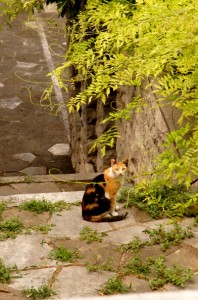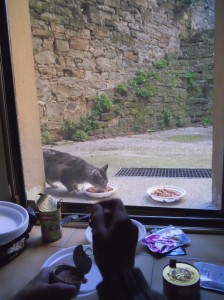
They used to be called randagi or stray. Gatti liberi is the proper term today for cats that live outdoors usually in a feline colony. You know, the ones you see sauntering around city streets or hanging out in a public park where they’re allowed to live. Typically these ferals are maintained by a feeder, the ubiquitous gattara/o.
Remember the film, ‘Born Free’? That’s the idea here. Free, liberated, allowed-to-live-in-the-open cats.
So, while in English a free cat might sound like one’s up for adoption at zero cost, in Italy we’re talking about freely living outdoor cats. And get this, they are protected by the Italian law enforced by a well insinuated cat culture. Sure like everywhere else in the world, anti-cat people might do mean things to a gatto libero or incessantly bother the nearest feline colony. But these are protected and the cat guardians and the feline colonies they’re responsible for have every right to stay and be where the cats have claimed territory.

That includes both public and private property. In “Gatti liberi tutelati anche se vivono nei condomini” a blog post refers to the rivamped animal welfare law in the early ’90s: Italian national law no. 281, 1991. That’s the famous no-kill law, the modern turning point for the welfare of domestic cats and dogs in Italy.
“Promoting a correct (environmental) cohabitation with the colony, the person responsibile for the feline colony must operate conscientiously, respecting the location and the people, making as little disturbance as possibile by feeding at regular hours not under the sun nor under parked cars – and not leaving trays or papers on the ground”. And as the title of the article above says, “Free cats are protected even if they live in apartment complexes”.
Part of the responsibility of the cat guardian is also spay/neutering the free cats and watching out for their health. If living in a well-run animal caring city in Italy, there’s always someone to turn to if a gatto libero is in need of medical attention. The public vet at the local Health Department (ASL), city hall’s animal welfare office and animal welfare associations are obliged to register and effect the spay/neuters. Often times, that’s in theory because cat guardians do end up shelling out for the vet’s bill.
Free cats in Italy are legally protected, feline colonies under correct management and distributed responsibilites (public & private) and animal welfare associations are contributing towards a rivisited, not to say new, urban domestic animal awareness; what I like to call the free cat code. (Sounds better in Italian though: il codice del gatto libero !)
I like cats to be free. They are independent creatures, but there is a problem. The male cat. He comes round on a regular basis. I think he counts the days- and cat mamas, like human mamas, need to space their litters so they don’t wear out before their time. A cat who is always pregnant or nursing- especially a “free” cat- often does not have enough nutrition- and that’s just too hard on her, as it is on human mothers. She needs time to really recover.
That is why spay/neuter is important — or spay/vasectomise depending on what theory you believe in.
Pingback: Cats in Italy | Cat Daily News
There is a female cat in the area of the apartment we are holiday renting at Nesso, Lake Como. She cries very loudly and looks very mangy and is deaf. I have been told the lady who feeds her has gone away (holiday?) but her owner is an old man whose wife has died and he seems incapable of caring for the cat. The gentleman lives nearby I understand. I have been feeding her and keeping her well supplied with water and she is crying not so much. I am only here until 24th September. I think the cat needs help please.
Thanks for the very informative blog about free cats in Italy.I live in the USA .I hope American culture begins to get more concerned with the care of both stray cats and dogs. I love the more polite phrasing of “free” cats! They are,aren,t they! Grazi.
Pingback: 5 Off-Beat Attractions In Rome | Jagabond